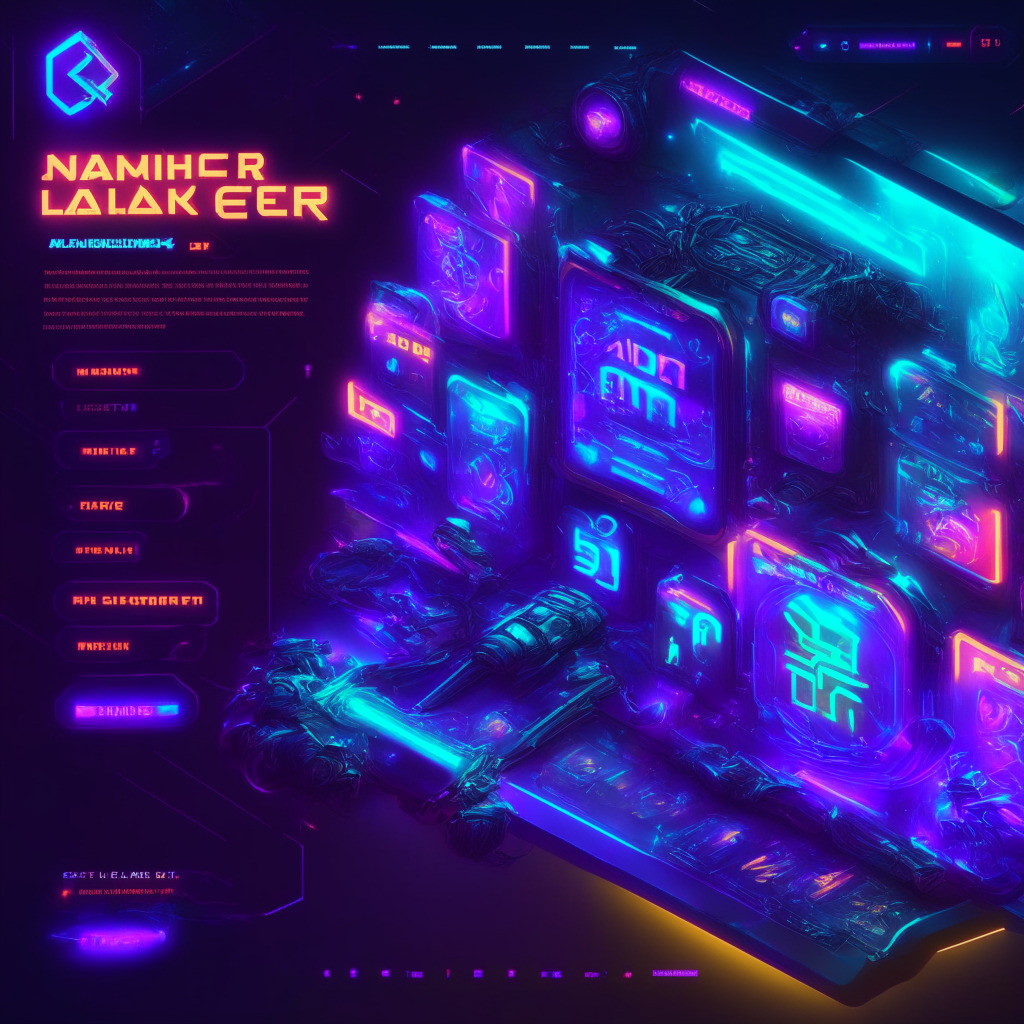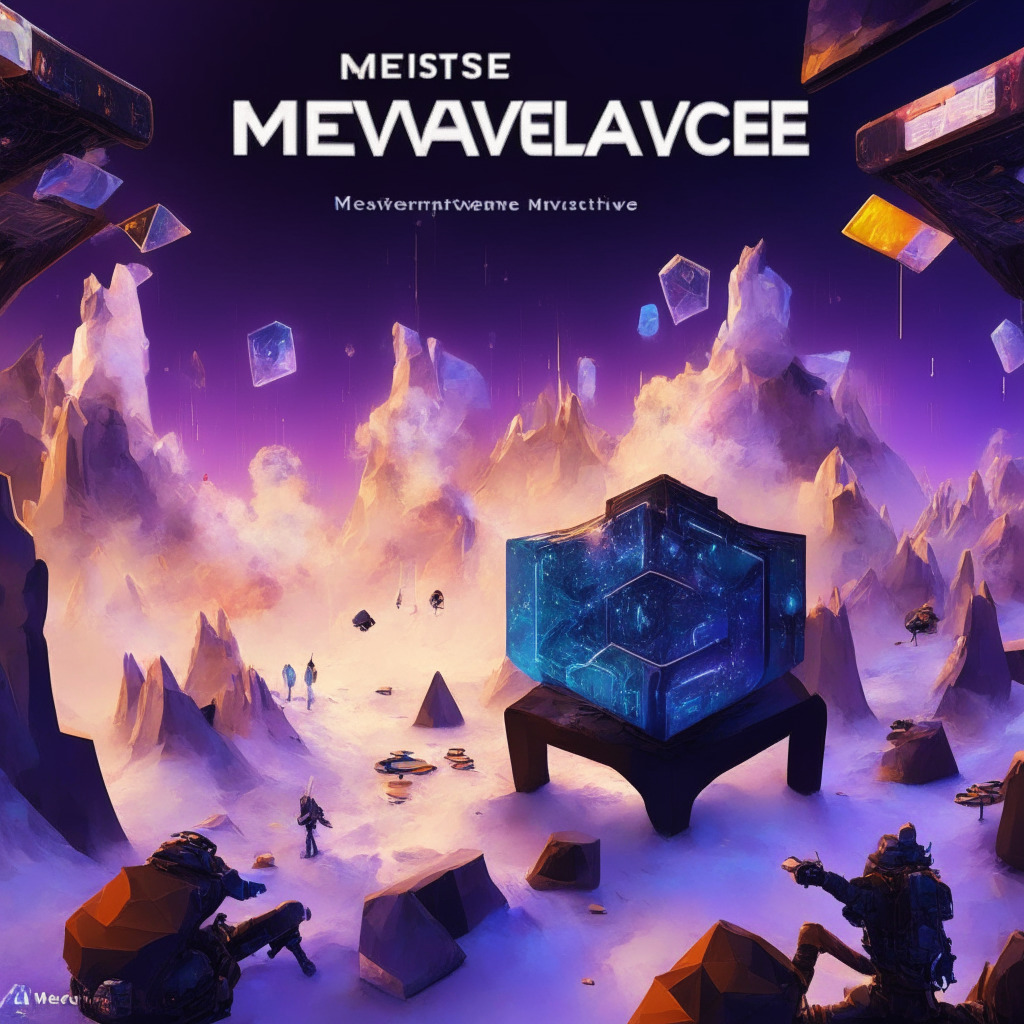In the Roblox metaverse, Bitcoin Miner Beta allows users to simulate real-life bitcoin mining, gaining more popularity than actual cryptocurrency metaverse platforms. This raises questions about the popularity of Web3 metaverse projects and the future convergence between Web2 and Web3 gaming experiences.
Search Results for: Web2
Luxembourg Competition Authority’s Pioneering Blockchain Market Study: What’s at Stake
The Luxembourg competition authority plans to conduct a first-of-its-kind market study into blockchain technology, aiming to evaluate competition between emerging blockchain-based companies and established Web2 businesses while examining potential anti-competitive practices against Web3 projects. This pioneering probe signifies a changing attitude towards the technology’s role in digital and environmental landscapes.
Metaverse Ownership Divide: Web3’s Promise vs Reality and the Future for Creators
The emerging Web3 ecosystem aims to revolutionize creator engagement, privacy, decentralization, and data ownership. However, implementation challenges, uncertainty about optimal business models, and debates over metaverse ownership raise questions regarding its transformative potential amidst existing digital power structures.
Web3 Technology: The Future of Consumer Loyalty and Engagement Programs
Web3 technology has the potential to revolutionize customer loyalty and engagement, offering unique rewards, exclusive experiences, and utility-based digital collectibles through blockchain. As businesses explore Web3-based loyalty programs, collaboration with experienced tech partners and seamless integration can lead to success in an increasingly competitive market.
GameStop & Telos Partnership: Exploring Web3 Game Launcher’s Pros and Cons
GameStop partners with Telos Foundation to develop GameStop Playr, a Web3 game launcher aimed at distributing AAA Studio games using Telos blockchain infrastructure. This collaboration aims to attract new customers to Web3 gaming and eliminate existing barriers for Web2 players transitioning to Web3.
GameStop and Telos Foundation Unite: The Future of Web3 Gaming and Risks to Consider
GameStop has announced a strategic partnership with The Telos Foundation to boost its Web3 gaming offerings by integrating Web3 games built on Telos’ robust blockchain network with its upcoming game launchpad, Playr. This collaboration aims to eliminate barriers, making it more accessible for Web2 players to explore Web3 gaming while attracting new users to the emerging ecosystem.
Tamadoge Arcade App: Revolutionizing Web3 Gaming and Bridging the Gap for New Users
Tamadoge, a leading web3 play-to-earn gaming platform, recently submitted their Tama Arcade app for approval on iOS and Android stores. Leveraging blockchain, smart contracts, and NFTs, the platform offers true ownership of in-game assets and simplifies the web3 gaming experience for new users through partnerships like Web3Auth.
Building the Web3 Metropolis: Challenges, Solutions, and the Path to a Decentralized Future
The Web3 industry envisions a decentralized, user-centric internet, but struggles to deliver engaging consumer experiences. Public blockchains offer interoperability and peer-to-peer networks, but Web3 must develop a responsive data layer for advanced applications and prioritize enjoyable interactions to attract true residents and realize the virtual metropolis vision.
Regulating DeFi Applications: ConsenSys Proposal for UK Authorities and Its Challenges
ConsenSys, an Ethereum development studio, suggests that the UK government should focus on regulating crypto applications rather than blockchain protocols. This targeted approach aligns with Web2 internet regulation, addressing potential risks and specific activities without imposing limitations on blockchain infrastructure. The UK Treasury will review received feedback to shape its regulatory response, balancing safety and innovation in the DeFi and cryptocurrency industry.
Unraveling Crypto Complexities: Launchpad XYZ’s All-In-One Web3 Platform for Mass Adoption
Launchpad XYZ (LPX) is developing an all-in-one web3 platform to make the intricate world of cryptocurrencies more accessible. Focused on humanizing the experience, the platform offers a user-friendly portal showcasing various blockchain projects, aiming to facilitate mass adoption by bridging the gap between Web2 and Web3.
Essential Security Measures for Web3 Startups: Tips from Israel Crypto Conference Expert
At the Israel Crypto Conference, Shahar Madar of Fireblocks emphasized the importance of security in Web3 startups and shared insights to protect platforms and users, including establishing a security framework, access control, and developing a game plan against potential threats.
7 Promising Cryptocurrencies to Watch: CAKE, INJ, WMS, Ecoterra, Mask, yPredict, and QNT Explored
Cryptocurrencies CAKE, INJ, WMS, Ecoterra, Mask, yPredict, and QNT are gaining investors’ attention due to their unique features and potential for growth. PancakeSwap offers a farming feature, Injective focuses on decentralized finance, and Ecoterra promotes recycling while yPredict leverages AI technology.
Crypto Startups Secure Millions for Web3 Gaming: Dissecting the Pros, Cons, and Future Evolution
12 crypto startups raised over $151 million this week, highlighting the growing interest in Web3 gaming. Openfort secured $3 million to develop its wallet-as-a-service product, with plans to use account abstraction for a seamless gaming experience. The surge in investments indicates a promising future for Web3 gaming, blockchain platforms, and new technologies.
Rise of Pudgy Penguins: NFT Revival, Trojan Horse Strategy, and Community Empowerment
The Pudgy Penguins NFT project highlights the importance of strong community support and effective leadership in overcoming setbacks. After a turbulent start, entrepreneur Luca Netz acquired and rebuilt the brand, focusing on developing intellectual property and bridging the gap between real-life toys and digital NFTs to drive success.
How Reddit and Polygon Paved the Way for NFT Adoption and Web3 Synergy
Reddit’s NFT launch on the Polygon platform successfully onboarded 9.7 million users within ten months, driving substantial user engagement. Collaborations with brands like Nike, Starbucks, and Sotheby’s demonstrate Polygon’s credibility as it aims to become the “value layer of the internet,” aligning with the growth of cryptocurrency and blockchain technology.
Film3 Movement: Revolutionizing Cinema with Web3 and NFTs, Challenges Ahead
The inaugural MetaCannes Festival highlights the Film3 movement, which utilizes Web3 technologies to empower minorities and underrepresented voices in the traditional film industry. By embracing decentralized financing methods like NFTs, Film3 aims to give more power to creators throughout a movie’s lifecycle, revolutionizing the way we experience cinema.
Dispersion Capital’s $40M Fund: Web3 Infrastructure’s Resilience Amid Crypto Market Slowdown
Despite the recent crypto market slowdown, Dispersion Capital launches a $40 million fund focusing on pre-seed and seed investments in Web3 infrastructure projects. Founder Patrick Chang emphasizes the importance of bridging infrastructure gaps and building decentralized tech layers for future multi-chain, multi-currency, and multi-platform applications.
Manta Network and Linea’s zkSBT: Enhancing Privacy in Crypto & Blockchain Applications
Manta Network partners with Linea to introduce zero-knowledge soulbound tokens (zkSBT) to maintain user privacy on blockchain platforms. The collaboration aims to provide decentralized, trustless, and private identity verification for various applications without compromising on-chain activity data or requiring KYC screenings.
TON Foundation’s $25M Accelerator Program: Boosting DeFi and Attracting Global Talent
The TON Foundation recently introduced a $25 million accelerator program dedicated to supporting emerging projects on the TON blockchain, with a focus on decentralized finance (DeFi). Financial backing from the Toncoin Fund will be offered in addition to partnership support and mentorship from accelerator partners.
Exploring Stepn’s Move-to-Earn Game: Apple Pay Integration and NFTs in Mobile App Marketplaces
Stepn integrates Apple Pay into its iOS app’s in-app marketplace, enabling users to purchase NFT sneakers using a novel in-app currency called Sparks. This move-to-earn game app rewards players with crypto tokens as they walk or run and aims to blend blockchain gaming with Apple’s extensive reach, potentially onboarding millions of users into the Web3 domain.
Bowling Achievements Turned NFTs: Pros, Cons & the Future of Digital Awards
The Professional Bowlers Association (PBA) and Bowlero have launched League Bowler Certification Awards, tokenized achievements in the form of non-fungible tokens (NFTs), on the Avalanche blockchain. These soulbound tokens will be airdropped to around 300,000 Bowlero league participants to recognize their bowling accomplishments, paving the way for blockchain integration in the sports industry.
Apple Pay Integration in STEPN Game: Boosting Web3 Adoption or Just a Temporary Fix?
The move-to-earn game STEPN integrates Apple Pay as a fiat onramp for in-app purchases, expanding accessibility and eliminating the need for a crypto wallet to purchase in-game NFT assets. This strategic step aims to onboard the next 100 million users to Web3 and remove barriers to entry.
Coinbase Cloud Joins Chainlink as Node Operator: Boosting Decentralization and Smart Contract Security
Coinbase Cloud announces a partnership with blockchain oracle network Chainlink, operating as a node operator to improve decentralization and smart contract reliability. By leveraging its global infrastructure and blockchain data expertise, Coinbase Cloud aims to enhance Chainlink network’s security and reliability, connecting smart contracts to data and systems.
Crypto Gaming Revolution: NFTs, In-Game Economies & Overcoming Skepticism
Cryptocurrency and gaming are converging, with crypto-based video games and non-fungible tokens (NFTs) as virtual assets on the rise. Matt Sanders, Avenged Sevenfold vocalist and early crypto adopter, believes NFTs can revolutionize in-game economies by making high-value digital assets transferable and sellable. However, he emphasizes that great gameplay should come first, with crypto rewards and incentives serving as supplementary features.
Nailwal Fellowship: Nurturing Early-Stage Builders or Risky Investment for Web3?
Polygon co-founder Sandeep Nailwal and venture capital firm Symbolic Capital launch the Nailwal Fellowship, providing $500,000 annually to fund 10 early-stage builders in the blockchain and cryptocurrency space. With $50,000 grant money, mentorship, and networking opportunities, this initiative aims to nurture Web3 technology talents and encourage diversity among builders.
Decentralizing the $100B Creator Economy: Web3’s Impact on Content Monetization and Ownership
The creator economy, facing challenges with centralized platforms like YouTube and TikTok, may benefit from the rise of Web3 technologies such as blockchain, cryptocurrency, and NFTs. By enabling direct audience connections, decentralized platforms, and innovative monetization methods, creators can regain control of their content and establish fairer income generation.
Binance Labs: Thriving Amid Regulatory Scrutiny and a $9 Billion Web3 Investment Strategy
Binance Labs, the venture capital arm of leading crypto exchange Binance, showcases long-term commitment to the growing industry with its $9 billion assets despite regulatory challenges. The firm strategically invests in early-stage seed and Series A-stage companies, focusing on decentralized finance and infrastructure projects facilitating the transition from Web2 to Web3.
Exploring Web3: Reshaping Ownership, Privacy, and the Future of Cryptocurrencies
Web3 aims to introduce “ownership,” where users control their own data, payments occur peer-to-peer, and data becomes decentralized. Despite challenges like scalability, its potential to grant greater privacy and data control makes Web3 a compelling concept for the digital age.
Redefining Product-Market Fit in the Web3 Crypto Landscape: Growth, Retention, and Adoption Challenges
Product-market fit (PMF) is crucial in the cryptocurrency and blockchain space, with companies like Spindl redefining attribution for Web3 and focusing on quality-oriented retention goals. Achieving PMF can be challenging due to diverse use cases, requiring clear roadmaps, vision, and branding to address adoption challenges. Adapting strategies to the unique Web3 landscape is essential for driving growth and finding the right PMF.
GameFi Revolution: Balancing Web3 Potential with Engaging Gaming Experiences
GameFi developers must balance earning potential with high-quality gameplay, unique mechanics, and engaging multiplayer experiences to attract gamers. Integrating cutting-edge Web3 technology, scalability, and seamless onboarding experiences can bridge the gap between crypto and gaming communities, driving adoption of other Web3 use cases like DeFi.
Alibaba’s Metaverse Launchpad and Web3’s Impact on Mainstream Industries: Embracing or Warning?
Major Web2 players, including Alibaba and Sports Illustrated, are entering the Web3 space, launching metaverse and NFT platforms on blockchains like Avalanche and Polygon, signaling growing interest and integration of Web3 technology into mainstream experiences.
Play-to-Earn Crossroads: Hybrid-Casual Game ScapesMania Revives Shattered Industry
The Play-to-Earn (P2E) market faces issues with plummeting token prices and user bases, while casual Web2 gaming thrives. Red Pill Company’s ScapesMania adopts a hybrid-casual approach, focusing on gameplay and functioning project revenue streams to appeal to Web2 casual players and revitalize the blockchain gaming industry.































